7 Computing Your Future
It’s difficult to think of any aspect of our lives that hasn’t been changed by computing. The idea of the Turing machine and its practical implementation in the stored program computer, just over seventy years ago continues to have a huge and growing impact on both our personal and professional lives. (Lavington 1998) Consequently, computing is a crucial skill in a wide range of careers across every sector of business and society. You don’t have to have studied Computer Science at University to take advantage of all the exciting opportunities provided by computing. This chapter looks at why computing is a subject for everyone. If you’re studying computing, this chapter isn’t aimed at you, unless you are struggling to stay motivated with your subject! 👨🏿💻👨💻👩🏽💻👩💻👨🏿💻
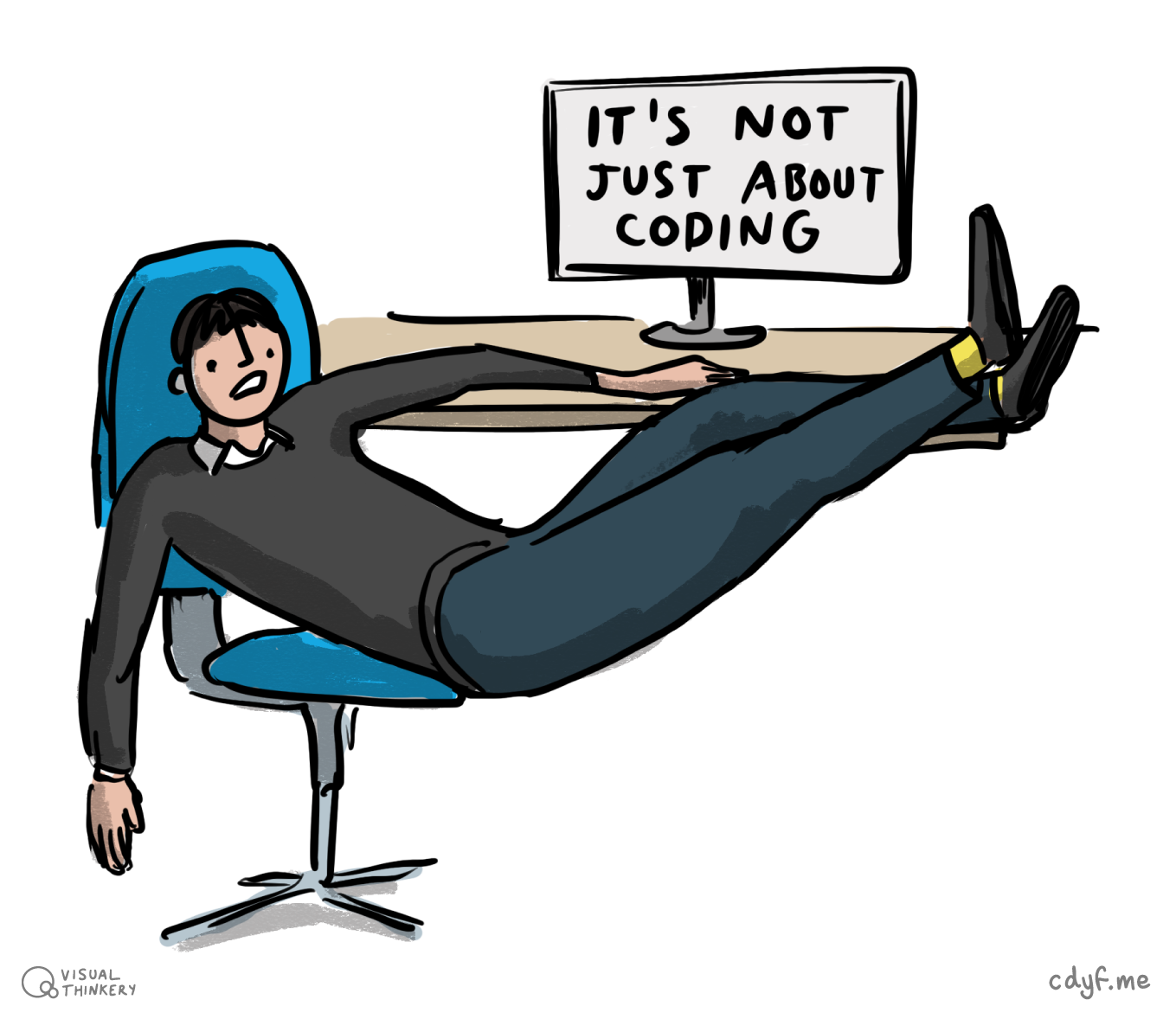
Figure 7.1: Computing is much more than coding, this chapter looks at what computing can do for your future. CV work sketch by Visual Thinkery is licensed under CC-BY-ND
Your future is bright, your future needs computing, so let’s start computing your future.
7.1 What you will learn
Reading this chapter and doing the activities will help you to:
- Identify where you can get started with computing, if you’re not studying computer science as a major part of your degree
- Discuss the role of computing in society for everyone, not just those studying it at University
- Describe why NOT studying computer science doesn’t necessarily “lock you out” of computing as a career
But why should everyone be studying computing? There are social and economic arguments:
7.2 Computing is for everybody
At school, everyone learns to read, write and do maths. These are sometimes known as the three Rs but:
- Why did you learn to read and write? Was it so that you could become a professional writer?
- Why did you study mathematics? Was it so that you could become a professional mathematician?
Of course not, that would be ludicrous! You learned to read and write because they are fundamental tools for expressing yourself and communicating with other people. You studied maths so that you could develop numeracy, reason about the world around you, analyse data and solve problems.
So why should everyone learn about computing? Is it so that everyone can become software engineers? Again, this is patently ludicrous.
Everyone should study computing for the same reasons everyone studies maths and english at school. Like writing, computing is one of the most creative tools for expression and communication that we have today. Just like mathematics, studying computing will also help you to solve important problems too. Sam Aaron, creator of Sonic Pi, puts exactly this case for creative computing in his TEDx talk (Aaron 2016) shown in figure 7.2.
Figure 7.2: Sam Aaron puts the creative case for computing by discussing programming as performance in his TEDx talk. You can watch the watch the 18 minute video embedded in this figure at youtu.be/0lTZ8Tuyu5I. (Aaron 2016)
Computing is also an intellectually stimulating and challenging subject to study in its own right. If you don’t believe me, I’m not going to make the case here. If you are a humanities student, have a look at Silvio Peroni’s free computational thinking and programming textbook at comp-think.github.io. (Peroni 2021) If you like doing Massive Open Online Courses (MOOCs), you might also enjoy and benefit from:
- CS50 with David Malan shown in figure 7.3
- online training courses provided by Microsoft, Amazon and Google described in section 25.4
Figure 7.3: David Malan on CS50, Harvard University’s introduction to the intellectual enterprises of computer science and the art of programming. You can also watch the watch the full 2 minute introduction video embedded in this figure at youtu.be/3oFAJtFE8YU. (Malan 2018, 2010)
So computing is for everyone, not just those with scientific, technological or engineering interests. What’s it actually all about.
7.3 Computer Science isn’t about computers
The name Computer Science is a bit of a misnomer because Computer Science isn’t…
- …a science. Anything that calls itself a science probably isn’t. (Hull 2011)
- …about computers, see figure 7.4.
Computer Science isn’t a natural science like Physics, Chemistry or Biology. According to Peter Denning, Computer science meets every criterion for being a science, but it has a self-inflicted credibility problem. (Denning 2005) In practice, Computer Science turns out to be blend of science, engineering and art9, see figure 6.2.
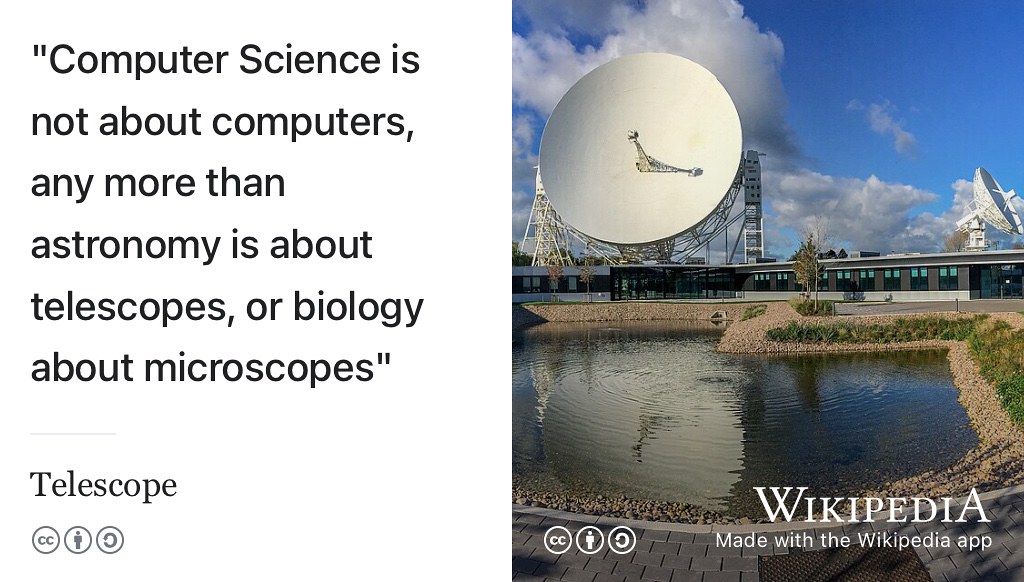
Figure 7.4: “Computer science is no more about computers than astronomy is about telescopes. Biology is not about microscopes, and computer science is not about computers. Computer science is a terrible name. Astronomy is not called telescope science, and biology is not called microscope science” —Anon. This quote is often attributed to Edsger Dijkstra though it is debateable who first coined this phrase. (O’Toole 2021) CC BY-SA image of a radio telescope at Jodrell Bank Observatory, headquarters of the Square Kilometre Array by Mike Peel on Wikimedia Commons w.wiki/3Lyf adapted using the Wikipedia App 🔭
So throw away whatever misconceptions you may have had about computing. There might be more in it for you than you previously thought. Whatever you think about computer scientists, there’s no doubt that software, and whatever computers it runs on, is likely to have an ever increasing importance in your life.
7.4 Software is eating your future
Whatever future world you enter into after you graduate, there’s a good chance it has already been eaten by software. In 2011, the software engineer and billionaire investor Marc Andreesen outlined why (in his opinion, figure 7.5) software is eating the world, in The Wall Street Journal (Andreessen 2011).
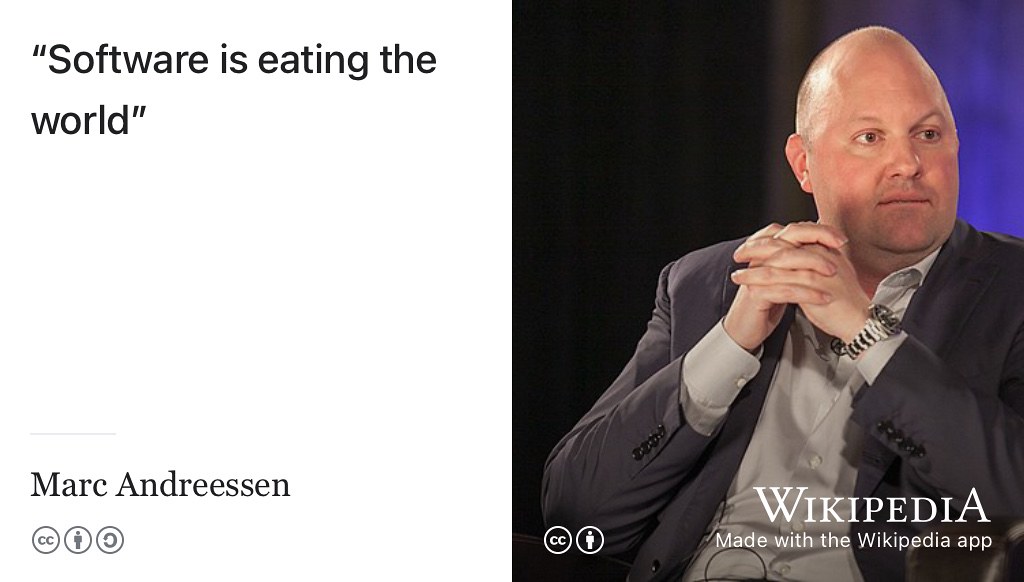
Figure 7.5: Whatever world you enter after you graduate, software has either eaten it, currently eating it or working out how to do so. Andreessen explains why software is eating the world and your future with it. Portrait of Marc Andreesen by JD Lasica on Wikimedia Commons w.wiki/3V48 adapted using the Wikipedia app 😋
Unfortunately, many people lack the digital skills required to take advantage of all the opportunities provided by software and computing. Robert Sedgwick at Princeton University has, like many others, argued that Computer Science should be a required topic of study for all undergraduate students in University. (Sedgwick 2019) We’re not there yet because computing is a subject that has historically been siloed in Computer Science Departments, but this is changing as we’ll see in this chapter. It’s not that everyone should jump ship to Computer Science, but that:
- Computing is too important to be left to Computer Scientists, see figure 7.6
- Computing is too important to be left to men (Spärck-Jones and Runciman 2007)
Whatever subject you are currently studying, adding some computing to your education will empower you with the computational thinking skills you need to be an active producer, not just a passive consumer in modern society. Computing can open up new opportunities for you and improve your social mobility.
7.5 Software is enshittifying your future
Although software giveth, it also taketh away. Like any technology, computing can be used for good and bad purposes. So I’m not just encouraging you to take computing more seriously because it can be used for beneficial purposes. As well as eating your future, software is also enshittifying your future as shown in figure 7.6. (Doctorow 2024) You’ve probably already experienced the enshittification of software you have used, here’s how it works in three steps.
- Software is good to its users
- Software abuses its users to make things better for their business customers. e.g. serving more ads or charging you for “premium” features which used to be free
- Sofware abuses its business customers to get back value for their parent organisation, for example through profiteering or price gouging after monopolising a sector
According to Doctorow, this three step process helps to explain why software platforms decay over time.

Figure 7.6: As well as making the life better, software also has the capacity to make it worse through a process known as enshittification. As Cory Doctorow points out “From Mercedes effectively renting you your accelerator pedal by the month to Internet of Things dishwashers that lock you into proprietary dish soap, enshittification is metastasising into every corner of our lives. Software doesn’t eat the world, it just enshittifies it.” (Doctorow 2024, 2025; Weatherbed 2022) CC-BY SA Portrait of Cory Doctorow by Dominik Butzmann / re:publica on Wikimedia Commons w.wiki/97EH adapted using the Wikipedia app 💩
This is why software is important for everyone, as double-edged sword that makes life better or worse.
7.6 Computing is eating the world
Besides the social arguments, there are also strong economic reasons for studying computing. It’s not just software that’s eating the world, but its combination with hardware that dominates the list of the world’s largest corporations by market capitalisation, shown in figure 7.7. What use is software without hardware?
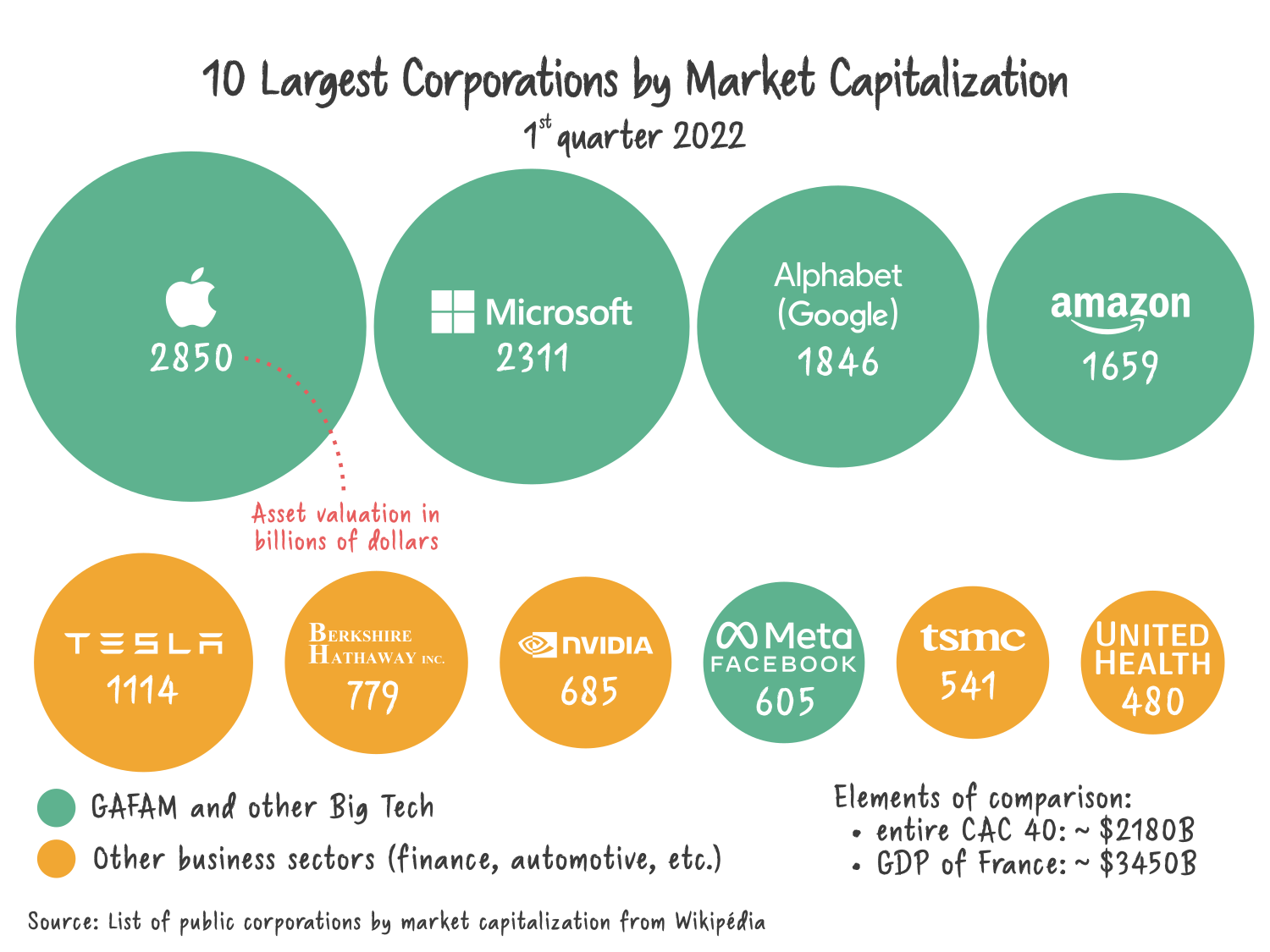
Figure 7.7: If stock markets are anything to go by, computing is eating the world. It would be impossible for Big Tech companies like Apple, Microsoft, Amazon, Alphabet (Google) and Meta (Facebook) to exist without computing. The ten largest corporations by market capitalisation (as of 2022) graphic by YBSLE/laboussole.coop on Wikimedia Commons w.wiki/3KEU
Even if you don’t want to work for any of these global oligopolies, their success is good news for all students of computing because it shows how important computation is to society, both commercially and otherwise. Another visualisation of data in figure 7.7 is shown in figure 7.8.
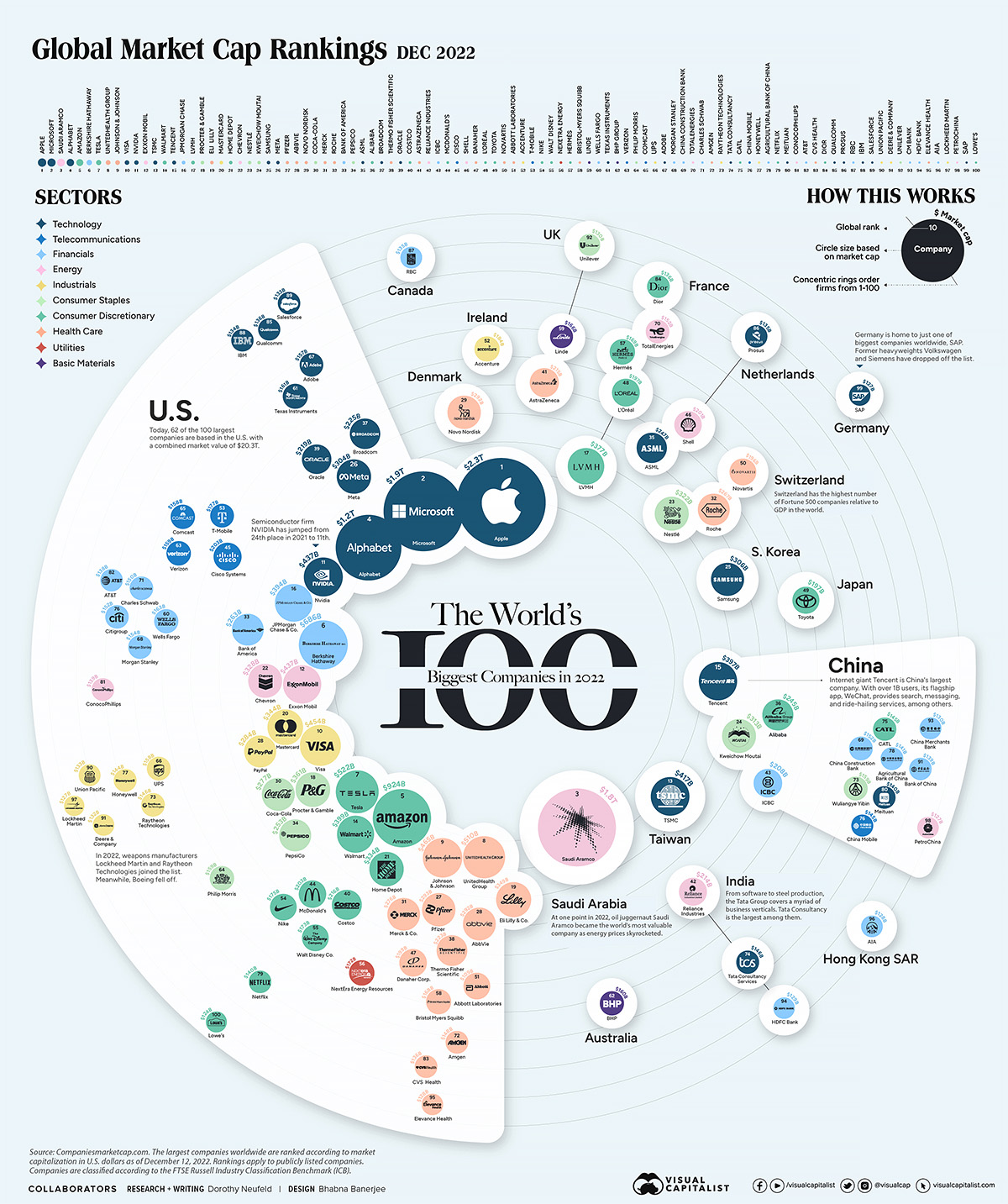
Figure 7.8: The 100 Biggest Public Companies in the World based on their market capitalisation in 2022. Note the dominance of software and hardware: Apple, Microsoft, Alphabet (that’s Google), Facebook and Amazon. Visualisation by Bhabna Banerjee and Dorothy Neufeld at the visualcapitalist.com, including a higher resolution image (Neufeld 2022) You can also see the same data in tabular form at financecharts.com/screener/biggest
During 2022 and 2023, there were significant redundancies at Big Tech employers, see layoffs.fyi for examples. (Ournalist 2023) Despite this, there’s still plenty of room for optimisim because what figure 7.7 and figure 7.8 show is that computing is still eating the stock market, with and without AI. (Thornhill 2023) This means while there will always be economic boom (and bust) commercial demand for software developers is often high, comparable to teaching and nursing in terms of raw numbers. In the UK, the most common jobs for graduates from 2019 are shown in figure 7.9, based on data taken from an update on the graduate labour market in 2023 (Ball 2023)
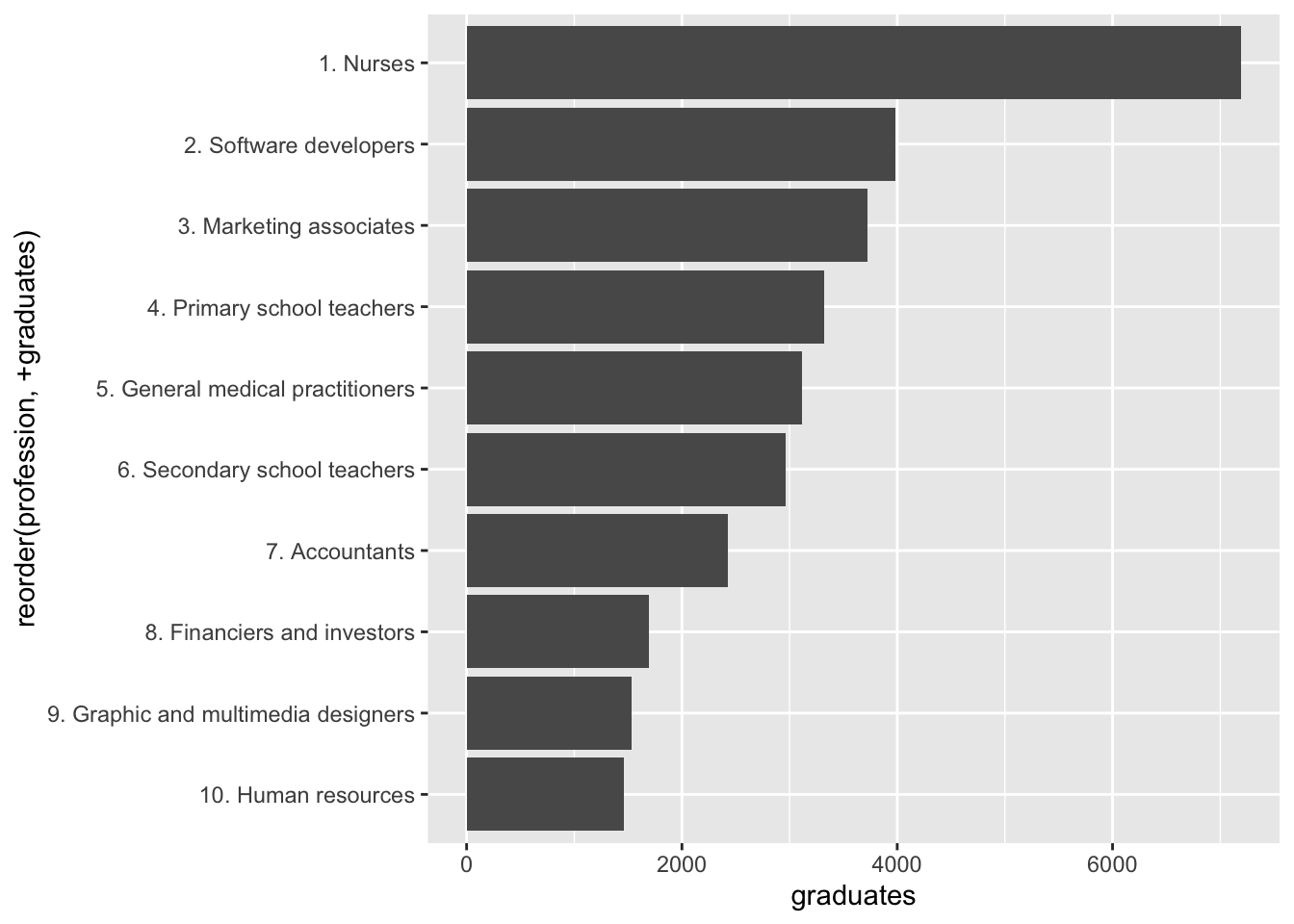
Figure 7.9: The top ten professions in the UK based on numbers of graduates starting work in 2020, shown on the x axis. In 2020, 3980 graduates started jobs in the UK as programmers and software development professionals, with many vacancies unfilled. So, demand for software developers is high, comparable to teachers, nurses and medical professionals, according to data published by prospects.ac.uk (Ball 2023)
So if you can develop software, there’s lots of choice and opportunities on offer. Although the data in figure 7.9 is from the UK, the story is the same in many other countries around the world.
Demand for developers is high, with many job vacancies going unfilled.
7.7 Passive consumer or active producer?
All this choice is a great thing but what sort of role do you want computing to play in your career? You can either be a passive consumer of computing or you can be an active producer, shaping the world of computing to get want you want from it, rather than what it wants from you. Going back to Andreesen’s eating analogy in section 7.4, sometimes the choice is to
- Be an eater or be eaten
- If you’re not at the table, you’re on the menu. (O’Toole 2020; Mieder, Shapiro, and Doyle 2012)
To use a gaming analogy, you either a player or you risk being played.
7.8 Play your joker: Computational joker
Because of its social and economic importance, computing also gives you flexible career options. If academic disciplines are playing card suits, then Computer Science is the joker in the pack shown in figure 7.10. A versatile card, the computational joker can be played with (and without) any of the traditional four suits: diamonds, clubs, hearts and spades. That’s because computing is a science and an art. It allows us to study human society and culture, so it’s part of the humanities too (see digital humanities and computational social science for example). Last but not least, computing is also an engineering discipline and a branch of mathematics too. What all this means is that the computational joker is a wild card that can be played whenever and wherever you like, making it an incredibly powerful but dangerous card, depending on the game you are playing (see chapter 6).
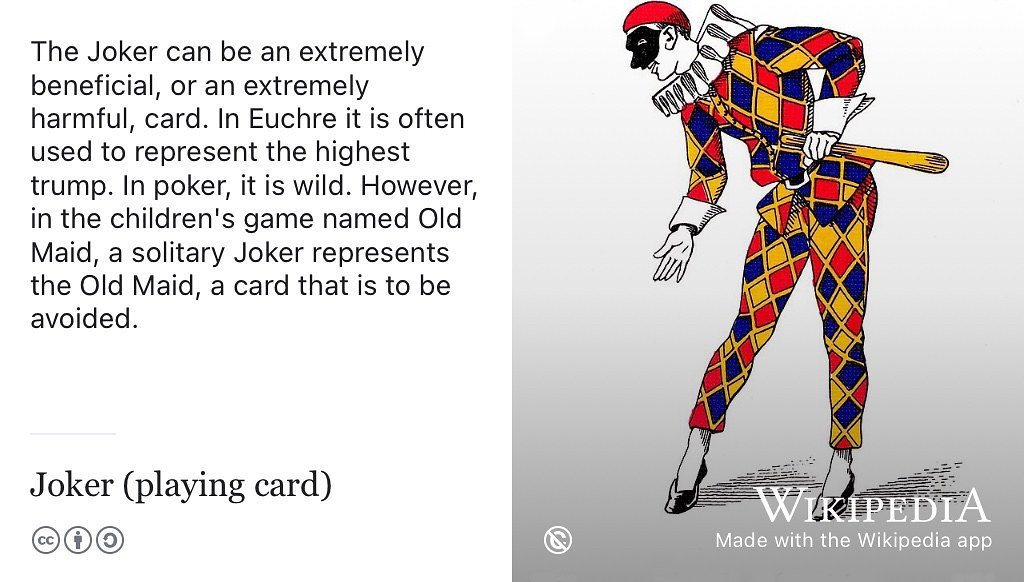
Figure 7.10: If academic disciplines are playing card suits then Computer Science is the joker in the pack. Just like computing, the joker can be an extremely beneficial card, or an extremely harmful one. It’s just like Lemmy says on the Ace of Spades, ... and don't forget the joker! (Clarke, Lemmy, and Taylor 1980) Public domain image of the Jolly Joker, a vintage Masenghini Italian playing card via Wikimedia Commons w.wiki/35EW adapted from the joker playing card using the Wikipedia app. 🃏
The flexibility of computing as a career means you have a broad range of options on where you can apply your computational skills. So how can you play your computational joker? Here’s some suggestions for playing your cards:
- 🃏 Look beyond the obvious employers: some of the best opportunities for you might be outside of big tech companies or other big blue-chip brands
- 🃏 Look beyond your discipline: some of the best opportunities for you might be interdisciplinary, mixing computing with other cards (hearts, diamonds, clubs and spades ♣♥♠♦) - see research software engineering in section 6.3.1 or digital humanities for examples from academia; there’s plenty of equivalents in industry too.
- 🃏 Look beyond obvious the roles and skills such as software engineering. Being open-minded and flexible will avoid restricting yourself to a premature pigeonhole as a “one-of-these” or a “one-of-those”. As Bill Gates put it, your life isn’t a one act play, see figure 6.17. (Gates 2023) You’re likely to play multiple roles in your career, some of which we’ve outlined in section 6.3
Three simple suggestions for playing your computational joker. As Lemmy put it, “I don’t need your greed, the only card I need is the Ace of Spades, the Ace of Spades … and don’t forget the joker”! See figure 7.11 (Clarke, Lemmy, and Taylor 1980)
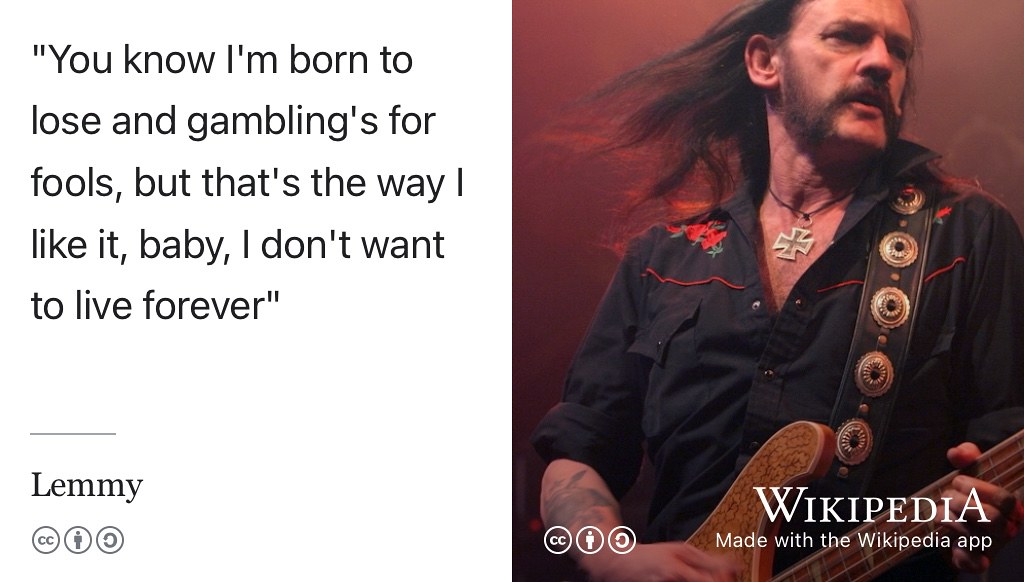
Figure 7.11: Lemmy was not a student of Computer Science but he frequently played his joker as the founder, singer, songwriter and bass guitarist in the heavy metal band Motörhead. (Clarke, Lemmy, and Taylor 1980) Creative Commons BY-SA licensed portrait of Lemmy performing in Edmonton, Canada in 2005 by Mark Marek on Wikimedia Commons w.wiki/CDZ9 adapted using the Wikipedia app. 🎸
You don’t have to be studying Computer Science or part of a röck döts band to play your joker. You don’thave to be studying Computer Science as a major (or minor) part of your degree to take advantage of opportunities described in this chapter, but it helps.
7.9 Summarising Your Future
Too long, didn’t read (TL;DR)? Here’s a summary:
Your future is bright, your future needs computing. There are lots of opportunities in computing but you don’t need to have studied Computer Science at University to take advantage of them. It will help if you can demonstrate a genuine interest in the computing through your PROJECTS (section 8.7.5), EXPERIENCE (section 8.7.4) and EDUCATION (section 8.7.3).
Apple co-founder Steve Jobs likened the computer to a “bicycle for our minds”, see figure 7.12. Just as cycling is a tool we’ve invented that makes our movement more efficient, so too computing is a tool which enables us to do some cognitive tasks more efficiently. Both computers and cycles enable us to travel further and more quickly than we could do otherwise. However:
- You don’t need a degree in cycling to make a career in cycling
… and therefore by analogy:
- You don’t need a degree in computing to make a career in computing
While studying computing at University will help you ride the computational bike better, it’s not a prerequisite for riding in the first place. Steve Jobs bike can be ridden by anyone keen enough to jump on their proverbial bike and keep pedalling.
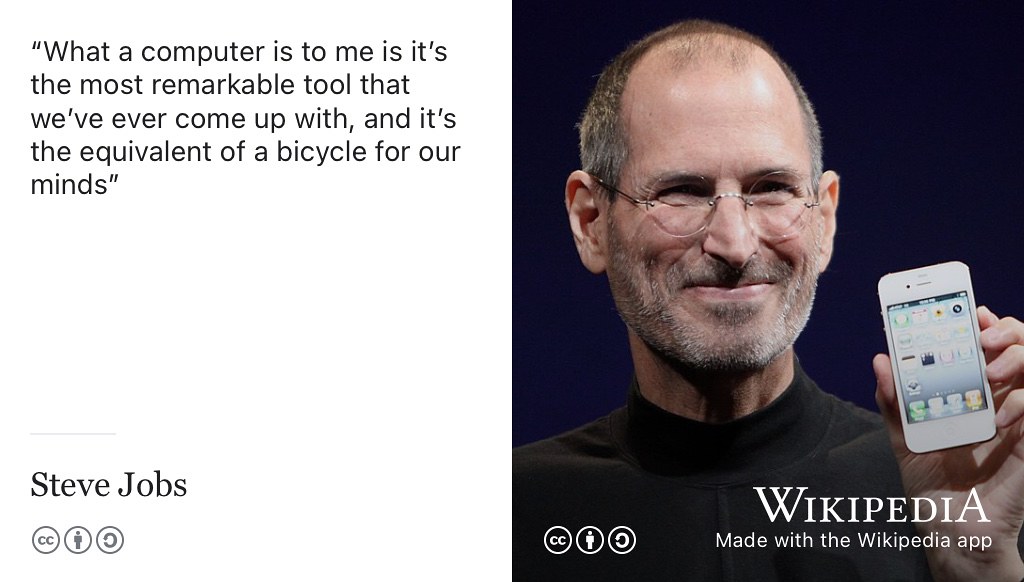
Figure 7.12: “I think one of the things that really separates us from the high primates is that we’re tool builders. I read a study that measured the efficiency of locomotion for various species on the planet. The condor used the least energy to move a kilometre. And, humans came in with a rather unimpressive showing, about a third of the way down the list. So, that didn’t look so good. But, then somebody at Scientific American (S. S. Wilson 1973) had the insight to test the efficiency of locomotion for a man on a bicycle. And, a man on a bicycle, a human on a bicycle, blew the condor away, completely off the top of the charts. And that’s what a computer is to me. What a computer is to me is it’s the most remarkable tool that we’ve ever come up with, and it’s the equivalent of a bicycle for our minds.” —Steve Jobs (Jobs 1980) Jobs is not talking about iPhones here, more about computing generally. CC BY-SA portrait of Steve Jobs unveiling the iPhone 4 at the 2010 Worldwide Developers Conference (WWDC) in San Francisco by Matthew Yohe on Wikimedia Commmons w.wiki/6in5 adapted using the Wikipedia app.
In this chapter, we’ve looked at some resources that can help you get started with computing if Computer Science is neither a major or minor part of your degree. They are accessible and often designed for people with little or no background in computing or mathematics. Some of them are specifically aimed at students from a humanities background. Whatever your background, you’ll need to be patient to learn the valuable skill of programming, according to Peter Norvig and Malcolm Gladwell it takes at least ten years (or ten thousand hours) to learn how to do it well. (Norvig 1998; Gladwell 2008)
We hope you’ve enjoyed this computational diversion, in the next part, chapter 8: Debugging your Future we’ll look at techniques for identifying and fixing bugs in your written applications so that you can maximise your chances of being invited to job interviews.